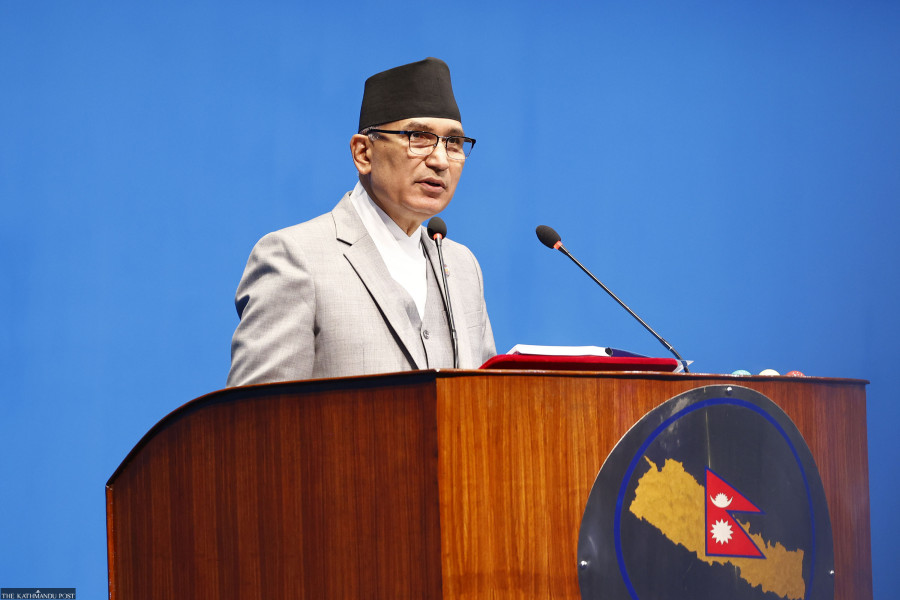National
Government goes against budget pledge not to implement small-scale projects
Experts decry centralised mindset as federal government takes up dozens of projects with budget less than Rs30 million—against what Finance Minister Paudel claimed.
Binod Ghimire
Presenting the federal budget in the joint session of the parliament, Finance Minister Bishnu Paudel announced that the government will not implement projects costing less than Rs30 million. “This is expected to support resource management for implementing national pride and nationally prioritised projects and to make project execution more effective,” he said on May 29.
However, Paudel’s announcement has not been reflected in the budget allocation. The KP Sharma Oli government is implementing even small projects with a meagre budget of a few hundred thousand rupees.
As per the budget details of the Ministry of Urban Development, the federal government’s subordinate offices will be implementing a drainage improvement project in Shuklaphanta in Kanchanpur district and an integrated settlement programme in Urlabari, Jhapa, worth Rs500,000 each. Similarly, it has allocated Rs1 million for the protection of Hiranyawarna Mahabihar in Patan and Rs2.5 million for a road improvement project in Katunje, Bhaktapur.
There are dozens of such projects that have a budget of less than Rs30 million to be executed by the federal government—against what Paudel claimed. Construction of Martyr Park worth Rs1 million in Belkotgadhi, Nuwakot and Langhung Cultural House worth Rs3.5 million are the other examples.
“The government’s commitment has not been reflected in the budget allocation,” said Khim Lal Devkota, a former member of the National Assembly who is an expert in federalism. “The centralised mindset of politicians hasn’t changed yet.”
Ever since the institutionalisation of federalism through the Constitution of Nepal, the provincial and local governments have been demanding that the federal government allow them to implement the small and medium projects. Their demands are based on constitutional obligations.
Schedule 5 of the constitution envisions construction of the central level large electricity, irrigation and other projects as the explicit authorities of the federal government. This means other projects fall under the jurisdiction of either provincial or local governments.
However, successive governments, against their reiterated commitments, have been eyeing even the minor projects like building drainages or construction of community halls.
Prior to the budget presentation last year, then prime minister Pushpa Kamal Dahal had made similar claims that his government would not execute any projects that carry the budget lesser than Rs30 million, allowing provincial and local governments to handle them. But against what he claimed in the different forums, his government allocated budgets for the hundreds of projects—several of which had few hundred thousands.
Experts say this shows that the federal government’s centralised mindset extends beyond the reluctance to devolve political power but also persists in handling infrastructure projects, despite repeated promises to embrace decentralisation.
Even today, local level is still short of over a third of the needed civil servants, who are still largely mobilised from Kathmandu. The same is the situation at the provincial level. The delay in the endorsement of the Federal Civil Service bill has affected the plan of different provincial governments to hire their own staff. Though the State Affairs and Good Governance Committee of the House of Representatives has finalised the bill, it is yet to be tabled in the parliament.
Similarly, successive governments have ignored the provinces’ repeated calls to adjust the police force at the provincial level. The federal parliament in 2019 endorsed the Police Personnel Adjustment Act and the Act to Govern the Operation, Supervision and Coordination of Nepal Police and Provincial Police Forces. Similarly, all the provinces have endorsed their respective provincial police laws to clear legal hurdles in overseeing their police forces.
However, they cannot set up police forces unless the federal government readjusts the existing force at the provincial level. The federal government has been claiming the adjustment would be done after revising the two Acts.




 13.12°C Kathmandu
13.12°C Kathmandu














